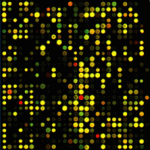Genomics
|
20 april 2012 14:20:50 |
| Proteomic profiling of the rat hypothalamus (Proteome Science) |
|
Tweet Background:
The hypothalamus plays a pivotal role in numerous mechanisms highly relevant to maintenance of body homeostasis, as the control of food intake and energy expenditure. Impairment of these mechanisms has been associated with the metabolic disturbances involved in the pathogenesis of obesity. Since rodent species constitute important models for metabolism studies and the rat hypothalamus is poorly characterized by proteomic strategies, we performed experiments aimed at constructing a two-dimensional profile of rat hypothalamus proteins, using the classical bottom-up proteomic approach.
Results:
We first established the best conditions for tissue withdrawal and protein extraction, quantification and separation. The extraction buffer composition selected for the proteome characterization of rat hypothalamus was urea 7M, thiourea 2M, CHAPS 4%, Triton X-100 0.5%, followed by a precipitation step with chloroform/methanol. 2-D gels of hypothalamic extracts from four-month-old rats were analyzed; the protein spots were digested and identified by using tandem mass spectrometry and database query using the protein search engine MASCOT. Ninety one hypothalamic proteins were identified, the majority of which were classified as participating in metabolic processes, consistent with the finding of a large number of proteins with catalytic activity. Genes encoding proteins identified in this study have been related to obesity development.
Conclusion:
The present results indicate that the 2-DE technique will be useful for nutritional studies focusing on hypothalamic proteins. The data presented herein will be a reference database for our studies about the effects of dietary manipulations on the hypothalamic proteome. We trust that these experiments will lead to important knowledge on protein targets of nutritional variables potentially able to affect the complex central nervous system control of energy homeostasis. |
| 117 viewsCategory: Biochemistry, Genomics |
 Comparative proteomic analysis of early salt stress-responsive proteins in roots of SnRK2 transgenic rice (Proteome Science) Comparative proteomic analysis of early salt stress-responsive proteins in roots of SnRK2 transgenic rice (Proteome Science)Effects of human and porcine bile on the proteome of Helicobacter hepaticus (Proteome Science) 
|
| blog comments powered by Disqus |
MyJournals.org
The latest issues of all your favorite science journals on one page
The latest issues of all your favorite science journals on one page



